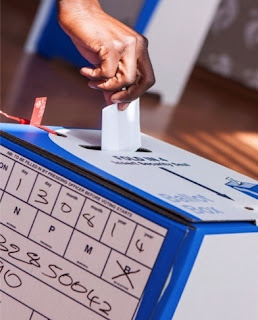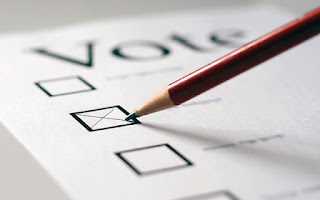Lowest Voter Turnout In South African History: Is Our Democracy Still Legitimate?
“I think the people have a sufficient sense of what the Mandela and the others struggled for, and when they look at certain things that are happening, for instance the issue you are mentioning […] quite correctly, it is a matter of corruption… When they see this corruption in the country, which seems to be increasing, at all levels of government, the people are aggrieved, they are saying ‘but this is not what freedom was for’.” (Mbeki, 2013)
I am once again quoting Former President Thabo Mbeki on a matter related to corruption in the Republic, the usage of this quote in this article is in response to the low levels of voter turnout in the last elections we had in the country or even arguably the decline that we’ve been seeing in voter turnouts as we hold more and more elections.
In its Founding Provisions, the Constitution of the Republic of South Africa Act 108 of 1996 (forthwith ‘the Constitution’) declares the Republic as ‘one, sovereign, democratic state’ founded on a plethora of values such as 1(d) “universal adult suffrage, a national common voters roll, regular elections and a multi-party system of democratic government, to ensure accountability, responsiveness and openness.”
The Constitution has ensured that there are certain measures in place to ensure the realization of this value and one section that is of interest to us today is s19 which is titled “Political Rights”, here subsection 2 states that “every citizen has the right to free, fair and regular elections for any legislative body established in terms of the Constitution.”
In order to ensure this, South Africa holds elections once every five years, this is true for National, Provincial and Local Government Elections (henceforth ‘LGE’). The last LGE we held, done so to elect councils for metropolitan, local and district municipalities in all 9 provinces, were in 2021, this would then mean that prior to that we had such elections in 2016.
There are many ways for citizens to express dissatisfaction with the government and although toy-toying has proven to be one of the quickest and most effective, voting is the biggest tool at the hands of the general public, it is the ‘x’ that can collectively bring down a legitimate government. The intent of this article is to analyze and compare voter patterns between the 2016 and 2021 elections; identify and point out the reasons for the decline in voting and provide possible solutions which are to be adopted going forward.
The year 2016 was probably the best year for elections in South Africa with a few records too: more than 26.3 million people were registered to vote, 740 000+ special vote applications were made and more than 73 million ballot papers printed. It is therefore concerning that we went from celebrating such impressive numbers to only have 12.2 million people voting 5 years later, the natural question to ask then is where did we go wrong?
Although South Africa is being lauded by some as the economic hub of Africa with a GDP of 418 billion US Dollars (inclusive of the President’s ‘stolen’ 4 million USD), there are numerous reasons why people have stopped seeing politicians as Messiahs whose sole intention is to pull humanity out of the gutter and this paradigm shift has inevitably led to a tremendous decrease in voting throughout the country.
Deeply rooted issues such as, inter alia, a seemingly stagnant economy; corruption; preposterous levels of poverty which are directly linked to social ills such as unemployment; growing inequality which is directly premised on race; high costs of living as well as a culture of crime which has dug its claws deeply into our society.
Perhaps all these would be forgivable to the electorate if there wasn’t a debilitating moral compass amongst our leaders which has led to intentional bad governance which consequently perpetuates all the above. This has led to a sense of distrust and hopelessness throughout the country from metropolitans right down to the most remote of villages.
The low turnout in voting has led to an argument being made which sought to question the legitimacy of our democracy because “how legitimate is our government then if in a population of 59 million people, only 12.2 million voted?”. While I do acknowledge just how concerning it is that only 45.87% of people eligible to vote have come out to exercise that right, I do not agree that this indicates an illegitimate government.
What it proves, rather, are two things which surprisingly are on two ends of the spectrum; firstly that the population is tired of the empty promises enthusiastically made during election season only for things to remain the same and at times, get even worse and as a result, the majority has lost faith in the rotation of leaders we have right now and has opted to express that through non-voting until the vehicle of change is in motion (whether this is effective or not is an article on its own).
Secondly and perhaps most importantly it proves to us that despite politicians continuously bamboozling people while misusing state resources dragging each other in and out of courts endlessly, there are citizens, however small the number, that still have faith that things can turn around for the country.
The good news is that a correct diagnosis of the problem means that we are halfway to the cure. I do have to state that I do not believe it is possible for any one leader to effect real change in the space of 5 years no matter how well meaning they may be simply because our problems are deeply entrenched (i.e. the culture of ‘cold drink’ runs so deep and it is nothing but a microcosm of the state of the country itself, these minor acts of backdoor practices add up to make up the country’s DNA thus the effects are at a large scale).
While I am not pushing for ‘soft dictatorship’ of any kind, I believe it really is humanly impossible for change to take place in 5 years in any given society, this is why the most economically thriving societies operate way differently from us. Although this is the case, I do believe our biggest solution under the system we have in place would be a change in attitude among public servants.
We need to start having honest people in public service, I am aware I might be asking for the impossible here but that is where it starts because the problem is not our policies, the problem lies with those who are standing in the way of proper implementation of all these papers we draft year in year out.
I am not convinced that a rehabilitation system is effective or even necessary in the event that people who have been tasked with overseeing and implementing the basics like service delivery do not only choose to fail dismally but have otherwise opted to enrich themselves at the expense of the most vulnerable. I believe that retributive justice is more appropriate in such circumstances, maybe if we were to relook putting in place more punitive means only specifically as a response to those who seek to worsen the quality of the State.
In conclusion, the problem for the average person in the street isn’t necessarily the sort of electoral system we have in place, it is simply that people have lost confidence in the quality of our leaders. It is only a matter of time until we see the words of Former President Nelson Mandela in action: “if the ANC does to you what the Apartheid government did to you, then you must do to the ANC what you did to the Apartheid government.”



I fully agree with you, implentation is what is needed, but we don't have qualifying leaders in government to process it.
ReplyDeletetipobet
ReplyDeletebetmatik
poker siteleri
kralbet
betpark
slot siteleri
kibris bahis siteleri
bonus veren siteler
mobil ödeme bahis
4EW2